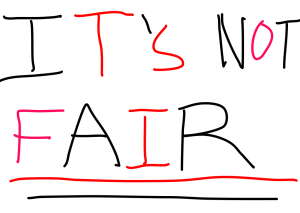 In a world where it seems that every child is awarded a trophy for just being on the team, for showing up – or because “he tried real hard”, the question comes up: Is it always fair for everyone to be in the same class, learning the same material at the exact same time and rate? Is it fair for everyone to get everything in life equally without regard to the effort they put forth or the results they achieve?
In a world where it seems that every child is awarded a trophy for just being on the team, for showing up – or because “he tried real hard”, the question comes up: Is it always fair for everyone to be in the same class, learning the same material at the exact same time and rate? Is it fair for everyone to get everything in life equally without regard to the effort they put forth or the results they achieve?
Could it be that one child has more talent at this given time, has put forth more effort, spent more time practicing, and therefore is just better than another person who has put forth little effort and just expects that they will be awarded with a prize for showing up.
On the other side of that question – is it possible that there has been favoritism shown for some over others, they have been given preferable time to practice or the team has been built with only the best players. Fairness is not just giving the same amount or same thing to everyone. While it is important to give to all what they need and deserve, it is also important that when given that opportunity and what appears to be ‘more’ than others that we show appreciation by our own actions.
How disgraceful it would be, to be given the extra time and attention – and then not put forth the effort to improve, or to take for granted and just expect that we should always get that attention no matter what our own efforts and actions are. Getting what we need, deserve and is appropriate comes with the responsibility to use it and put forth our own efforts to reach our goals.




